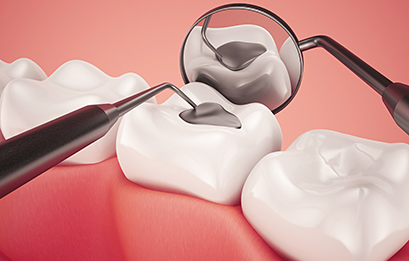Comprehensive Dental Care

Our main objective at Trillium Smile Dentistry is to help patients preserve their oral health and longevity of their teeth.We provide a complete array of dental care with emphasize on preventive ounce of prevention is worth more than a pound of cure.
Studies have shown a direct link between dental health and overall health. We keep your mouth healthy and monitor for conditions that may occur. Detecting problems early is important for maintaining and saving natural teeth and preventing painful dental emergencies. We provide optimum cleanings and regular evaluations to monitor oral health.
Dental Cleaning
At Trillium Smile Dentistry we believe in preventive dentistry. Regular dental cleaning is the most important way of maintaining your oral health. When you visit us for dental cleanings, our registered dental hygienists provide oral cancer screening and the dentist checks your teeth to ensure they are in good status. We take X-Rays every year to detect any dental cavities, fractures or infections.
The typical process of a cleaning visit includes:
- First you rinse with antibacterial mouthwash
- Then removing tartars above and under your gum line around your teeth will be performed. Our Hygienists will perform this gently by special instruments and make sure you are comfortable during the whole appointment.
- Polishing with special paste will be done after your teeth are cleaned to remove any stains and give you refresh feeling.
- The dentist will come to check your teeth after they are cleaned.
- At the end Flouride paste will be applied to your teeth to make them stronger against dental cavities.
Fillings


Dental Fillings are used to help restore teeth that have been damaged by cavities or fractures. A “filling” helps repair the tooth in a way so it can return to its normal shape and function. It also helps prevent the tooth from decaying more and causing more damage. Fillings are made from different materials including composite resin and Amalgam.
Root Canal Treatment
Most dental cavities are solved with a simple filling. However, if a cavity grows large enough to reach the nerve or pulp inside a tooth, you may require a root canal instead. Cavities this severe are often accompanied by severe pain. They can also sometimes be found when your dentist replaces old amalgam fillings or during routine filling appointments.
During a root canal procedure, the dental infection inside your tooth is removed. This includes the infected pulp and nerve. The tooth will then be filled. Covering this tooth with a crown afterwards is recommended to protect it from fractures and restore its appearance. When your dentist is done, your tooth will look and function almost exactly as it did before.
Extraction
Removing a tooth can be frightening and sound painful. When it is necessary to remove a tooth, we make sure you are comfortable and pain free during the procedure. Depends on the situation, Dr. Tousi might recommend to have bone graft to prevent further bone los after extracting the tooth. We always discuss options for replacing missing teeth before hand and if necessary, we make arrangements for immediate replacement so you don’t walk out without a tooth.
Dental Crowns and Bridges
Dental crowns are prosthetic shells that can cover a tooth above the gumline if it is broken, decaying, or otherwise damaged enough to make a regular filling impossible. Your dentist may suggest a crown if you have lost a filling or want to replace a large amalgam filling. This will preserve the structural integrity of the tooth and make it less susceptible to breakage or wear.
Dental crowns can be made from many materials, but most are porcelain. Porcelain crowns look virtually identical to a natural tooth and are durable enough to last many years.
A dental bridge combines two dental crowns with one or more tooth replacements to fill in gaps left by missing teeth. T The teeth on either side of the gap act as anchors to secure the bridge. They are prepared for crowns, and the bridge is fitted over them. The replacement tooth is suspended across the gumline. Dental bridges do not provide the same level of function as dental implants. However, they will allow you to chew most foods comfortably, prevent your teeth from drifting out of alignment, and look nearly indistinguishable from natural teeth.
Some reasons why you might need dental crowns or bridges include:
- A broken tooth.
- Missing teeth.
- Fractures in or around fillings.
- Replacing large fillings.
- Extensive dental decay.
- Root canal treatment.
- Cosmetic purposes.
